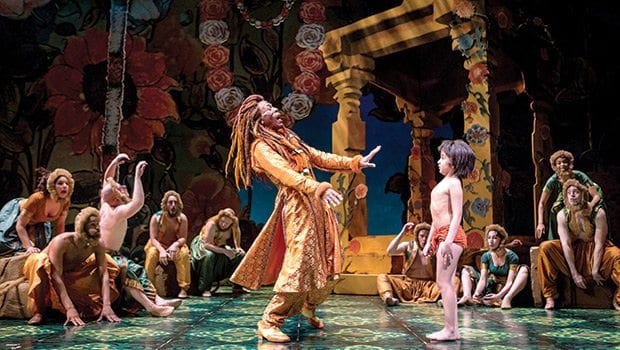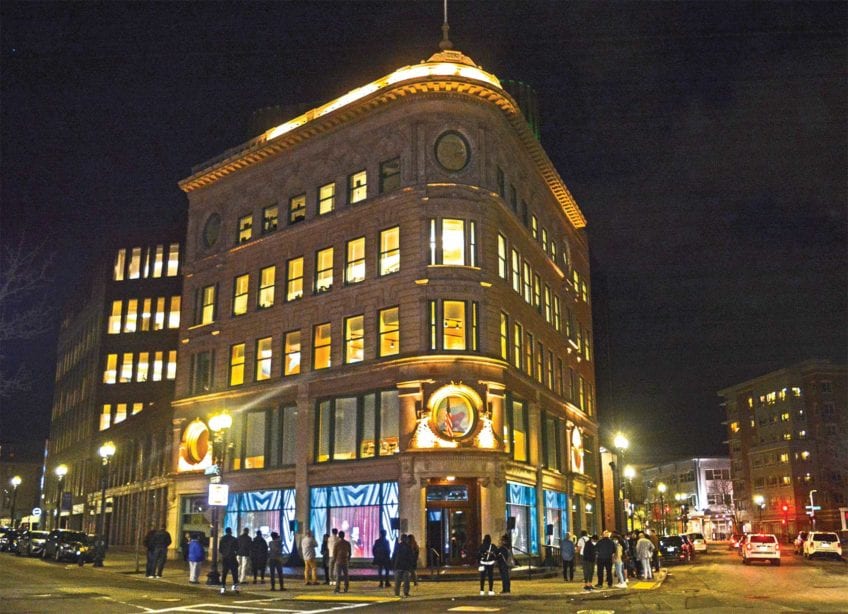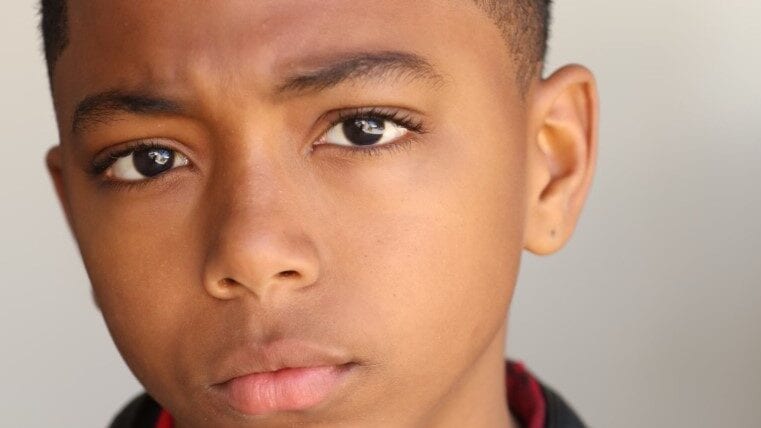Welcome to the jungle: ‘The Jungle Book’ play is a joyful dream at Huntington Theatre

Author Rudyard Kipling transformed the 19th-century colonial India of his childhood into a realm of adventure in “The Jungle Book.” In turn, Walt Disney recast Kipling’s dark tales into a high-spirited 1967 animated musical movie. Now onstage at the Huntington Theatre through Oct. 20 is a sweetly spectacular live production of “The Jungle Book,” directed by Tony Award winner and MacArthur Fellowship (“genius award”) recipient Mary Zimmerman.
The stage of the Huntington’s BU Theatre in Boston teems with music, dance and singing as well as memorable turns by the show’s actors and 14-piece orchestra. While the first of its two acts is slow to gel story-wise, this irresistible production at times approaches the controlled delirium of a Marx Brothers comedy and the pageantry of a Bollywood extravaganza.
Unfolding like a child’s joyful dream, this coming-of-age story set in an animal kingdom invites comparisons with another stage musical, “The Lion King,” directed by Julie Taymor, also a MacArthur Fellow and Tony Award winner drawn to turning timeless fables into stage musicals.
Produced with Disney Theatrical Productions in association with Chicago’s Goodman Theatre, where it played this summer, Zimmerman’s “The Jungle Book” is more of a boutique production, capitalizing on intimate details to captivate the audience.
While the story of the “man cub” Mowgli forms the musical’s slight plot, Zimmerman’s true subject is the sheer joy and conjuring power of live performance. Celebrating a pleasure gene lineage stretching from Kipling and Walt Disney to Louie Armstrong as well as Indian classical music and dance, Zimmerman has concocted a delicious mulligatawny — the chicken stew flavored with local spices devised by Indian servants for their British patrons — and added a dose of New Orleans gumbo.
The “man cub” Mowgli first appears as a cloth figure of an infant. She-wolf Raksha (Anjali Bhimani) discovers the baby, and leading a lullaby in a lovely voice as her pack howls along, she quickly wins the debate about whether they will eat the cub or raise him. The rest of the first act consists of Mowgli’s encounters with various species in the jungle, each an excuse for a euphoric episode of song and dance.
Mowgli, as played by Akash Chopra (alternating the part with Roni Akurati), brings a winning naturalness to his role, expressing the glee of a boy whose buddies are a protective panther and a fatherly bear.
Wearing a sleek black costume, Usman Ally is Bagheera, a talkative, philosophizing panther. Encircled by wires that suggest girth, Kevin Carolan is lumbering and lots of fun as Baloo the bear, who bonds with the boy by singing his infectious anthem to taking it easy, the Terry Gilkyson song, “The Bare Necessities.” Later, when a band of monkeys kidnaps Mowgli, Baloo belts a mournful blues.
The singing, dancing actors lend their animal characters personalities and trademark tics.
Nikka Graff Lanzarone, on towering stilts as a regal peacock, imitates the head-jerking movements of a bird scanning for sounds.
The wolves’ exuberant tails spring up on cue. A gang of raucous monkeys explodes in hoots. A quartet of vultures wearing black stovepipe hats and white feather boas chants, “We’re hungry flesh eaters but we’re not mean.” As Kaa, a snake who hypnotizes his prey, Thomas Derrah snickers in a brocade tunic.
Daniel Ostling’s gorgeous sets, Mara Blumenfeld’s expressive costumes and the music and choreography evoke the British India of Kipling’s lifetime. Atmospheric lighting by T.J. Gerckens illuminates the telling details as well as the show’s swirling spectacles.
Constantly shifting like the patterns in a kaleidoscope, the jeweled-tone set frames the scenes in flower-painted panels that rise, fall, part and fold together. Ornate cabinets lift musicians into the air, the better to display them. A divan suspended from the ceiling delivers reclining aristocrats such as Shere Khan, an aged but menacing tiger who relentlessly hunts Mowgli, the meal he has eyed for years.
As music director, Doug Peck adapted many songs from the Disney film and he conducts the show’s first-rate, 14-member orchestra, whose members play western brass, reeds and percussion as well as the sitar, carnatic violin, tablas and oud. Just as the music crosses eras and cultures, Christopher Gattelli’s choreography combines the serpentine movements of classical Indian dance with elements of jazz, tap and break-dancing.
Outfitted in scarlet uniforms to resemble a military marching band of the British Raj, the musicians often stride from the pit onto the stage while playing their instruments, where actors dressed as butterflies dance around them. In one scene, the brass and percussion players become part of an imaginary elephant parade. As the music ends, the marchers arrange their bodies into the shape an elephant, complete with a curving trunk.
All this showmanship could wear thin if the show remained little more than a series of song and dance numbers. But fortunately, the story gains a bit of momentum as Mowgli encounters various predators and gains survival skills.
Two louche aristocrats nearly steal the show, injecting a welcome bit of decadence into the jungle society.
As King Louie, an orangutan who leads a tribe of monkeys, André De Shields sings the jazz-inflected showstopper, “I Wanna Be Like You,” by Disney songwriters Richard and Robert Sherman, brothers who wrote most of the movie’s music. Monkeys mimic human behavior and these monkeys want to adopt the power to create fire.
Swaggering onstage in a lounge robe and orange dreadlocks, King Louie looks like a party animal roused from much-needed sleep. Presiding over the frenzied monkeys with a crooked grin, he injects his sarcastic song with gospel fervor and then, easing into a jazz cadence, pulls out an orange hanky in a tribute to Louie Armstrong.
The only villain is Shere Khan, the aged tiger who has hunted Mowgli for years. As portrayed by Larry Yando, he is a complicated character. Licking his fingers after devouring a deer, he is seductive but cynical in a regal turban and robe. Voicing his matter-of-fact appraisal of life in the song, “Your Unexpected Friend,” Yando’s tiger takes “The Jungle Book” beyond a childhood adventure and reflects on the boundaries between humans and animals as well as life and death.
Celebrating the transporting magic of imagination, the story begins and ends in a grand drawing room, with a boy and his book.






